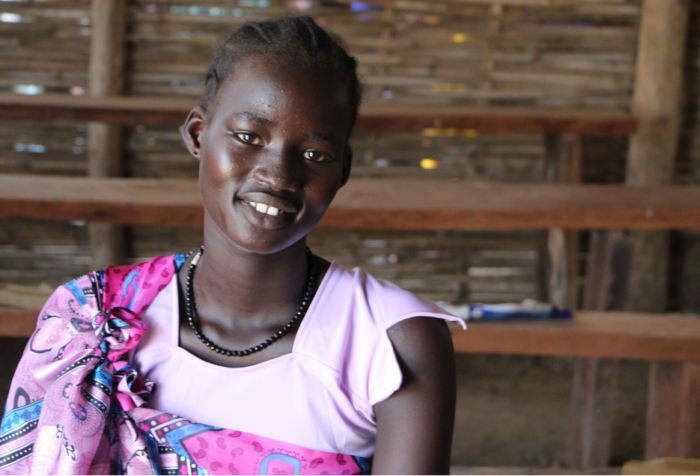Cash Transfers Help Displaced Mother Throughout COVID-19
February 4, 2021 10:52 am“There are things expected of me especially as a mother, I need to provide for my baby, for myself and, do housework. I looked forward to receiving this money so that I can afford some of the things for myself and for my baby since schools are closed and I can’t buy school materials. This money helps me a lot”.

Elizabeth is a young mother and a student in Senior One in Hope Secondary School which is based in the Protection of Civilian (PoC) site for displaced persons in Juba. Elizabeth’s case is not uncommon. Many girls across South Sudan become mothers at a very young age. A large majority of these girls do not return to school, but some, like Elizabeth, make it back to class.
Although early pregnancies are commonplace, young mothers are often stigmatized and publicly shamed when they return to school, leading to a second wave of dropouts. It is also common for school management to forbid girls from returning to school once they marry or become pregnant. Early and unintended pregnancies therefore jeopardise educational attainment for thousands of girls across the country.
As a displaced young mother living in the PoC camp, Elizabeth is already facing many challenges, but COVID-19 has added another layer of uncertainty. As schools remain closed for all learners, except those that are about to sit exams (Primary 8 and Senior 4 leaners) across South Sudan due to the virus, learners struggle to cope with the new reality of distance learning and families are struggling to make ends meet. Before the crisis, a very high population was already living on one dollar or less per day. This time is especially is difficult for people whose lives have been directly affected by conflict and displacement. Those in the PoCs are already struggling with overcrowding and a lack of basic services.
Apart from the challenges that schoolgirls are facing due to the school closures, young mothers like Elizabeth face a unique set of challenges, “when I am in school, I have free time to read my books but now I am at home all the time so, I have to do all the house work and also take care of the baby, my mother in law helps me when I am in school but now I am not”. Living in a family of nine, Elizabeth says it is difficult to make ends meet, “No one is working at home, we depend on the food rations given to us. This money is the only one I can get to support me”.
The GESS Cash Transfers are aimed at helping girls across the country and their families cope with the challenges that have been made worse due to COVID-19. School girls speak of how this money will help them stay focused and return to school someday. “I am having many things to buy but I don’t have money because I have no one to support me. Receiving this money tells me that someone cares for me to go to school and I just want to go back to school when they open, and I hope to become a doctor”.
The Cash Transfers support girls who are usually enrolled in school and regularly learning. However, the money does not help girls who are denied an education by school management due to pregnancy. However, in a landmark moment for pregnant girls, the Ministry of General Education and Instruction (MoGEI) has ordered that pregnant learners must be able to sit their examinations during February of this year, and to finish their education. Stay tuned for more information on this important directive.
To read more about the Cash Transfers that were delivered in 2020, go here.
Categorised in: Cash Transfers, Girls' Education